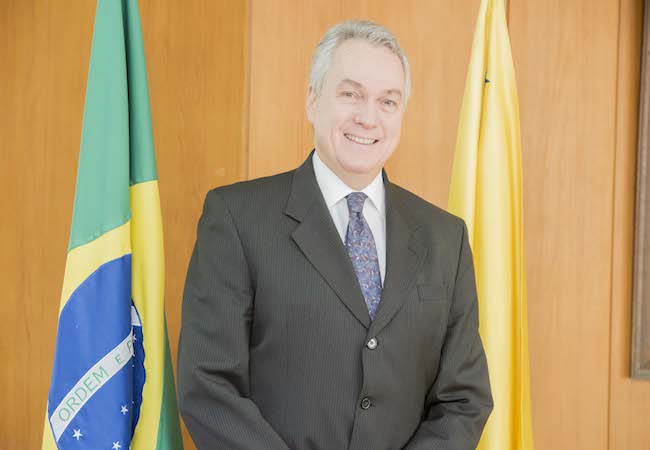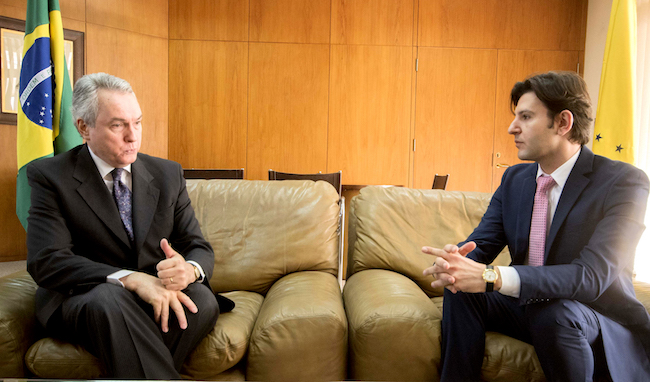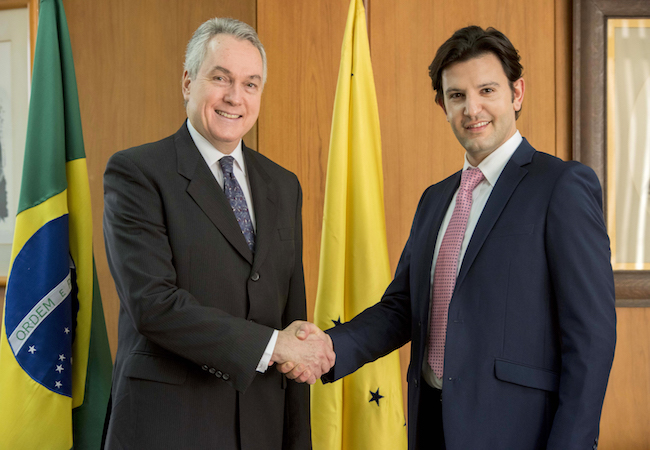Saudi Arabia and Brazil – The development of a successful partnership

By Alexander Woodman
Riyadh, Saudi Arabia. Diplomatic Quarter
The history of the semi-centennial diplomatic relations between Saudi Arabia and Brazil dates back to 1968. The embassies of both countries were opened five years later, in 1973 in Brasília and Jeddah. However, in 1986, the Brazilian Embassy in Jeddah moved to Riyadh. The next step toward a fertile bilateral relations development between both countries was the agreement of Economic and Technical Cooperation between Brazil and Saudi Arabia which was signed in Brasilia on 2nd April 1975. Since those historical events took place, Saudi Arabia and Brazil have kept on track with the main purpose of strong diplomatic relations; independent equality for each country, the protection of global peace and safety, and to upgrade the level of friendly ties between nations.
Many official visits were held between the representatives of the two countries, but it was not until 2000 that the first official governmental visit by the Saudi House representatives took place. The visit was conducted by the late Custodian of the Two Holy Mosques, King Abdullah bin Abdulaziz Al Saud, who was the Crown Prince of Saudi Arabia at that time. This gathering uplifted the bilateral relationship to a new level.
At the same time, President Luiz Inácio Lula da Silva had also taken a substantial step to improve the state of cooperation with the Middle East. President Lula da Silva became the first Brazilian Head of State, to make an official visit to the region, to attend the 2003 Arab League Summit. A series of new agreements were signed between Saudi Arabia and Brazil during this visit of the President to Saudi Arabia. They included: 1) a General Agreement on Cooperation, 2) a Memorandum of Understanding for the Establishment of Political Consultations, 3) a Memorandum of Understanding between the National Confederation of Industry (CNI) of Brazil and the Riyadh Chamber of Commerce and Industry along with several other vital pacts between both countries.

Flavio Marega replaced Ambassador Sérgio Luiz Canaes and began his duties on January 2014. Born in Paranavaí, Paraná he was raised in Marília, São Paulo and earned a degree in Law and History. Before this promotion, he was an envoy who served as the country’s representative in the World Trade Organization (WTO). He also worked at the Brazilian Embassy in Montevideo, Uruguay and was the Deputy Head of the MERCOSUR division at the Ministry of Foreign Affairs in Brasília. Other positions he held were as the Counsellor of the Brazilian Embassy in Washington, the Minister-Counsellor, and served as the Deputy-Head of the Mission of the Brazilian Embassy in London. The Ambassador has dedicated twenty-four years of his career to Diplomacy and related fields. Saudi Arabia became the first country where His Excellency Flavio Marega was assigned to become the esteemed Ambassador of Brazil.
On this occasion, the envoy Marega stated: “It will be an enormous challenge for me, and at the same time a rewarding experience to return to the country where I started my diplomatic career abroad.” He referred to his experience of working in Riyadh which dated back to 1990-1992 when he was head of the Trade Promotion Department of the Brazilian Embassy. The envoy has emphasized the evidence of a top level of relations ethics between the two countries. He specifically points out that: “Brazil and Saudi Arabia have always been connected by strong bilateral ties which have continued to increase their strength over the years.”
A.W. Brazil and Saudi Arabia established diplomatic relations in 1968, and since then both countries have experienced a stable and trustworthy affiliation. What is the key to developing strong bilateral ties and a reliable system of ethics between the two nations and their Ambassadors?
Amb. F.M. The key to our strong bilateral ties lies on mutual respect, coinciding views, and positions in most international issues and cooperation in multilateral fora. The role of the Embassy of Brazil under my direction is primarily to represent my country in Saudi Arabia. Additionally, the Embassy informs the Brazilian Government about political, economic, religious, cultural and social developments taking place in Saudi Arabia and Yemen as well as in the Gulf region. Thirdly the Embassy works continuously to create closer bonds between Brazil and Saudi Arabia in terms of trade and investment. Also, very important is the assistance given to the Brazilian community living in Saudi Arabia.

A.W. Following the opening of the Embassies in 1973 by both countries, an agreement for Economic and Technical Cooperation between Brazil and Saudi Arabia was signed in Brasilia on 2nd April 1975. How would you describe the cooperation of more than forty years, and what is your vision for the next forty years?
Amb. F.M. Starting from that agreement signed in 1975, many other bilateral instruments were signed or are under negotiation at present: i) Air services agreement between the Federative Republic of Brazil and the Kingdom of Saudi Arabia, signed on April 14th, 2015; ii) Memorandum of understanding between the government of the Kingdom of Saudi Arabia and the government of the Federative Republic of Brazil regarding regulating the process of issuing visit visas to the citizens of both countries, ready to be signed; iii) Agreement on defense cooperation between the Federative Republic of Brazil and the Kingdom of Saudi Arabia, under negotiation; iv) Cooperation and facilitation investment agreement between the Federative Republic of Brazil and the government of the Kingdom of Saudi Arabia Status, under negotiation; v) Memorandum of understanding for scientific and educational cooperation between the government of the Kingdom of Saudi Arabia and the government of the Federative Republic of Brazil, under negotiation; vi) Cooperation agreement between the government of the Kingdom of Saudi Arabia and the government of the Federative Republic of Brazil in the field of sports, signed on April 14th, 2015; vii) Agreement between the government of the Kingdom of Saudi Arabia and the government of the Federative Republic of Brazil on cooperation and mutual assistance in customs matters, currently under analysis by the Saudi Customs; viii) Memorandum of understanding on enhancement to co-financing between the Saudi Fund for Development and the Brazilian Central Bank, under negotiation; ix) Agreement on technical cooperation between the Federative Republic of Brazil and the Kingdom of Saudi Arabia, under negotiation; x) Agreement between the Federative Republic of Brazil and the Kingdom of Saudi Arabia on remunerated activity of dependents of members of diplomatic missions and consular posts, under analysis of the Saudi Ministry of Foreign Affairs; xi) Agreement for cooperation between the government of the Kingdom of Saudi Arabia and the government of the Federative Republic of Brazil on the peaceful uses of atomic energy, draft proposed by the King Abdullah City for Atomic and Renewable Energy (KACARE), currently under analysis by the Brazilian National Nuclear Energy Commission; xii) Agreement between the governments of the Kingdom of Saudi Arabia and the Federative Republic of Brazil on cooperation in the exploration and use of outer space for peaceful purposes, under negotiation.
A.W. The Kingdom of Saudi Arabia became the first country where you were appointed the Ambassador of Brazil. Please share what the most significant challenge was when you began this assignment. Furthermore, please comment on what your approach was to meet that challenge?
Amb. F.M. My first appointment to be the Ambassador of Brazil to Saudi Arabia was at the same time a challenge and a professional achievement. The Kingdom plays an increasing role internationally, with its presence and leadership not only in the region but also in the Arab and Muslim world.
As I have completed four and half years in Riyadh my mission should come to an end soon and I will leave Saudi Arabia soon. Together with the previous two and half years when I worked at the Embassy of Brazil in Riyadh – between 1990 and 1992 – I will have lived in the Kingdom for more than 7 years of my life. So, I will always carry in my heart and mind fond memories of the Saudi friendship and hospitality. I will also leave Saudi Arabia with a strong belief in the future of this great nation.
A.W. How would you outline the essentials components needed to form the appearance of a country from the perspective of diplomacy? Is there an actual scale which evaluates the appearance of a nation?
Amb. F.M. The basic work of diplomats is to represent, negotiate and inform their governments about the internal and external situation in the countries where they are posted. In the case of Brazil we have an additional component in our work which is to assist the Brazilian community travelling or residing abroad.
With regard to economy and commerce, diplomats should work to help increase bilateral trade between Brazil and the country where they are posted, especially the exports of national companies, as well as the attraction of Foreign Direct Investment to our country. Therefore, the image or appearance of a nation abroad is a direct result of how diplomats conduct the work above mentioned, always with the support from the authorities in capital.
A.W. Brazil and Saudi Arabia are the members of the Group of Twenty (G20), formed after the 2008-2009 economic-financial crises. What has been the most memorable contribution of each participant-country of this Group which has intended to solve the world’s most urgent challenges of last decade?
Amb. F.M. The G20 was initially formed to tackle the economic crisis in Asia (1997), Russia (1998), and Brazil (1999). By bringing together the most important nations in the world in economic terms, the G20 is an international forum where the heads of government or state, as well as finance ministers and governors of central banks, periodically confer to discuss issues related to the governance of the global economy. As a collective endeavor, the G-20 seeks to address issues that go beyond the responsibilities of any one country alone. Since the debut in 2008 at the summit in Washington, DC, there were many individual contributions by G20 members which led to the many successful outcomes until present. For example, the group helped to coordinate the policies that successfully averted a global depression following the 2008 economic and financial crisis. The fact that Saudi Arabia is the only Arab country member of the Group of Twenty (G20) illustrates its increasing importance in terms of trade, economic and investment relations.

A.W. To build the best future for the Country and its residents, the government of Saudi Arabia generated the national program “Vision 2030” on April 25, 2016. This program; hailed by many in the world, is aimed to create a “diverse and sustainable economy.” Please, discuss your understanding of the term “diverse and sustainable economy”?
Amb. F.M. The main objective of the Vision 2030Plan is to reduce Saudi Arabia’s dependence on oil and diversify its economy, by developing industrial and services sectors such as health, education, recreation, and tourism, among others.

The long-term objectives are the promotion of economic and investment activities, increased exchange of capital and goods with the foreign actors (both government and private), and increased government investments in national companies (including through Joint ventures with foreign companies) for the industrial production, especially in the defense sector.
A diverse and sustainable economy means reducing Saudi Arabia’s dependence on oil by developing other sectors of the economy in the industrial and services as above mentioned. For achieving its goals, I believe that the Vision 2030Plan should also include new frontiers of the economy by developing information technology, scientific knowledge, artificial intelligence etc.
A.W. Brazil has over 1.5 million Muslim residents and numerous Islamic institutions and organizations. Within these groups are many Saudi religious representatives, professors, and scholars who partake in the Islamic events in Brazil each year. Can the cultural diplomacy of different nations, cultures, and religions of the world construct and maintain global stability?
Amb. F.M. I should like to remind that the values derived from the Abrahamic faith are common both in Islam and Christianity and they truly constitute the basis of our civilizations. As a matter of fact, in Brazil believers of all faiths and creeds live together in peace, tolerance and harmony. This is something we Brazilians are very proud of. We are also known everywhere in the world as a hospitable and cordial people. In Brazil we live in peace and fraternity with peoples and races from all parts of the world in the spirit of respect and tolerance to one another. This is the reason why all kinds of religious beliefs and creeds can prosper in Brazil as this is certainly the case of Islam. In conducting our diplomatic work abroad, we follow this approach which I believe contributes and serves as an example to build and maintain global stability.
*This post contains affiliate link(s). Click here for Affiliate Disclosure.




